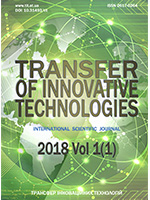Methods of determination of territorial resources in conditions of compacted urban development (using Kyiv as an example)
DOI:
https://doi.org/10.31493/tit1811.0104Keywords:
The exploited roof, potential territorial resource, typology of roofs, typology of the development, mathematical modelAbstract
The article highlights the results of the analysis of domestic and foreign experience of application of the applied coatings and a modified typology of roofs based on their geometric and structural features is proposed. The following factors that influence taking the decision on the need and directions of the use of the used roofs are provided. On the basis of the analysis of the dynamics of the normative and actual indicators of urban development, the constant growth of the development density and growth of the lack of territory for greenery and other elements of the population service are proved. The described methods for the determination of the resource potential of urban areas are normative method, comparative and calculation method. A new calculation method for identifying potential territorial resources of micro districts, blocks or individual plots due to the use of exploited roofs in conditions of compacted urban development has been proposed. The mathematical model is based on taking into account the geometric type of the roof, type of historically originated development, its technical condition and the availability of the status of the cultural heritage monument. Coefficients for the calculation of the potential territorial resource have been experimentally determined. Based on the example of Kyiv, using GIS-technologies, a specialized database for identifying a potential territorial resource has been formed. The recommendations for placement on different types of objects on the exploited roofs depending on the frequency of their visit and the cityplanning situation have been provided. The methodical scheme for the determination of a potential territorial resource due to the use of exploited roofs in the development of urban planning, design and land management documentation has been proposed.References
Le Corbusier, 1977. Arkhytektura XX veka. Moskva, Prohres, 303 (in Russian).
Yanet Martinez, 2007. Teaching Green. Environmental, Economical, and Educational Benefits: Proposal for a Green Roof at the University of California. Davis, 82.
Juan Sebastián Carvajal Muñoz, Charlie Esperanza Carmona García, 2015. Global research trends in green roofs: benefits, main developments and future needs. Producción + Limpia, Corporación Universitaria Lasallista, Vol.10, 173-185.
Francisco Toja-Silva, Carlos Peralta, Oscar Lopez-Garcia, Jorge Navarro and Ignacio Cruz, 2015. On Roof Geometry for Urban Wind Energy Exploitation in High-Rise Buildings. Brunswick Germany, Computational Fluid Dynamics in Civil Engineering, Vol.03, 299325. 5. Gruzen Samton Architects LLP, Amis Inc., Flack + Kurtz Inc., Mathews Nielsen Landscape Architects P.C., Shade Consulting, LLC, 2017. DDC Cool & Green Roofing Manual. New York, New York Department of Design and Construction, 70.
Corrie Elizabeth Clark, 2008. Energy Emissions Mitigation Using Green Roofs: Probabilistic Analysis and Integration in Market-Based Clean Air Policies. A dissertation submitted in partial fulfillment of the requirements for the degree of Doctor of Philosophy. Ann Arbor, The University of Michigan, 223.
Alla Pleshkanovska, 2005. Funktsionalnoplanuvalna optymizatsiia vykorystannia miskykh terytorii. Kyiv, Lohos, 190 (in Ukrainian).
Kateryna Bakun, 2017. Klasyfikatsiia pokryttiv v haluzi mistobudivnoho zastosuvannia. Mistobuduvannia ta terytorialne planuvannia, Kyiv, KNUBA, Vol.65, 63-70, (in Ukrainian).
Kateryna Bakun, Alla Pleshkanovska, 2018. Faktory, shcho sponukaiut do stvorennia zabudovy z ekspluatovanym pokryttiam. Kyiv, Suchasni problemy arkhitektury ta mistobuduvannia, Vol.50, 133-140, 500 (in Ukrainian).
Alla Pleshkanovska, 2000. Mistobudivne rehuliuvannia funktsionalnoho vykorystannia i zabudovy miskykh terytorii. Avtoreferat dysertatsii na zdobuttia naukovoho stupenia kandydata tekhnichnykh nauk, spec. 05.23.20 – Mistobuduvannia ta terytorialne planuvannia. Kyiv, KNUBA, (in Ukrainian).
Alla Pleshkanovska, 2013. Metodolohiia kompleksnoi rekonstruktsii mista. Avtoreferat dysertatsii na zdobuttia naukovoho stupenia doctor tekhnichnykh nauk, spec. 05.23.20 – Mistobuduvannia ta terytorialne planuvannia. Kyiv, KNUBA, (in Ukrainian).
Tetiana Kravchunovska, 2010. Klasyfikatsiia raioniv zhytlovoi zabudovy. Dnipro, Prydniprovska derzhavna akademiia budivnytstva ta arkhitektury, (in Ukrainian).
WarleyParsons, 2011. Issledovanie rynka zhilishchnyy syektor ukrainy: pravovyye, ryegulyatornyye, institutsionalnyye,
tyekhnichyeskiye i finansovyye aspyekty. London, Yevropeyskogo banka rekonstruktsii i razvitiya, Uan ekscheynch skver, 227 (in Russian).
Kateryna Bakun, 2018. Gis – tekhnolohii yak osnova vyznachennia terytorialnykh resursiv miskoi zabudovy. Suchasni problemy arkhitektury ta mistobuduvannia, Kyiv, KNUBA, Vol.51 (in Ukrainian).
Iryna Ustinova, 2017. Fractality of concentric structures in space of ecologic-urban planning systems. Underwater Technologies, Iss.07, 87-95. http://dx.doi.org/10.26884/1707.1902.
Iryna Ustinova, Anastasiia Chubarova, 2016. Spatial-Temporal Dimensions and Principles of Sustainable Development of Ecological and CityPlanning Systems. Motrol, Vol.18, No.10, 25-32.
Gennadiy Gyershanok, 2006. Formirovanie strategii ustoychivogo razvitiya lokalnykh territoriy na osnove otsenki sotsialnoekonomicheskoy i ekologicheskoy emkosti. Avtoreferat dysertatsii na poluchenie stepeni doktor ekonomicheskikh nauk cpetsialnosti 08.00.05 − Ekonomika i upravlenie narodnym khozyaystvom, Yekaterinburg (in Russian).
Nikolay Demin, 1991. Upravlenie razvitiem gradostroitelnykh system. Kiev, Budivelnyk, 184 (in Russian).
Klaus Sedlbauer, Eberhard Schunck, Rainer Barthel, Hartwig M. Künzel, 2010. Flat Roof Construction Manual: Materials, Design, Applications. Stuttgart, Walter de Gruyter, 208.
Nataliia Novoselchuk, 2010. Ozelenennia shtuchnykh osnov yak zasib ekolohichnoho ozdorovlennia miskoho seredovyshcha. Problemy rozvytku miskoho seredovyshcha, Kyiv, NAU, Vol.04, 88-92 (in Ukrainian).
Downloads
Published
How to Cite
Issue
Section
License
Copyright (c) 2020 Transfer of Innovative Technologies

This work is licensed under a Creative Commons Attribution-NonCommercial-NoDerivatives 4.0 International License.
Our journal abides by the CREATIVE COMMONS copyright rights and permissions for open access journals.
Authors, who are published in this journal, agree to the following conditions:
1. The authors reserve the right to authorship of the work and pass the first publication right of this work to the journal under the terms of a Creative Commons Attribution License, which allows others to freely distribute the published research with the obligatory reference to the authors of the original work and the first publication of the work in this journal.
2. The authors have the right to conclude separate supplement agreements that relate to non-exclusive work distribution in the form in which it has been published by the journal (for example, to upload the work to the online storage of the journal or publish it as part of a monograph), provided that the reference to the first publication of the work in this journal is included.




